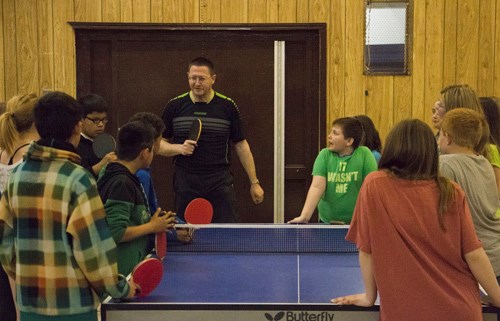Students at Arcola School recently popularized table tennis in the community through attending the Table Tennis Saskatchewan Provincial School Championships on April 17 and 18. They found success here and the students have seen the game popularized in school as well.
Within the students lounge there had been foosball tables, and this year a ping pong table was added. It didn’t take long before students began taking the fun activity to the competitive level. Jared Taylor, Brandt Freitag, and Dylan Cann, along with coaches Dan Graf and A.J. Schlenker began to inquire with the Saskatchewan Table Tennis Association about how to start the club.
After membership fees were paid the boys learned through online videos and began practicing. While at the provincial competition the boys did well earning medals.
During all of this Graf was working on a Membership Assistance Program (MAP) Grant. Through this grant the club will now be able to purchase two new tables, but also had the pleasure of bringing in the Saskatchewan Provincial Head Coach of Table Tennis, Paul Noel, to Arcola on Monday, May 11.
While at Arcola, Noel facilitated physical education classes and trained the Panthers Ping Pong team in a session after school.
Noel is from Belgium. He began playing table tennis at the age of six and by 11-years-old had joined a club. He did well through competition and would go on to obtain a Master’s in Physical Education and become a professional coach, after working his way up from an assistant coach.
He’s been involved in Belgium, Germany, Netherlands, Luxembourg, and Saskatchewan as a coach and has enjoyed his time giving back to the sport.
Table tennis, Noel states, is a great way to build skills as children grow and develop: everything from agility, balance, coordination, catching, throwing, hitting, running, and jumping within the game. It also develops youths’ dexterity and focus as they utilize hand-eye coordination to return an opponents’ hit.
“You have half a second, imagine that, half a second to analyze the direction, trajectory, speed, and spin,” Noel stated. “Then you must choose if you will use your backhand or forehand, get the proper angle of the racket, and put the ball over the net onto the table; but, not only onto the table you must play it to the right spot for the point.”
Very quick, it requires an immense amount of focus and helps youth develop both athletically and scholastically.
Noel says that there is a correlation between learning to play table tennis and how youth do in the classroom.
“I noticed coming to Canada that students were two or three years behind where they should be, that is the development of a child on the average,” Noel stated. “For kids who start playing table tennis, they begin developing basic mathematical skills and become better athletes in other sports. It’s the connection between playing table tennis with such a small ball and the relation that has to special awareness which can be applied to math and physics. I can point to math problems kids have just by watching play ping pong.”
What the youth in Arcola are doing is great for not only the game of table tennis, but for youth coming up through the school being exposed to it.
“In North America kids are taught to hit hard or throw the ball far,” Noel said referring to baseball. “With this they are using their motor skills to hit the ball on target and that is a very good bridge into other sports and to academics.”
“Introducing the sport to Saskatchewan, I’ve found the attitude Canadians have is that it is a sport for the Chinese because they suck at football and ice hockey; that it is a basement game for kids,” Noel said, which is not the case as can be seen above.
In fact Noel hopes to begin a project working with between 10 and 20 schools across Saskatchewan who will utilize table tennis as a regular program. Noel then hopes to analyze how students do athletically, but more importantly scholastically as well. This would be focused on youth from ages five to nine as a primary sport in the Saskatchewan elementary system.
“It’s part of my job to encourage grass root development, but to also develop higher playing,” he said.

